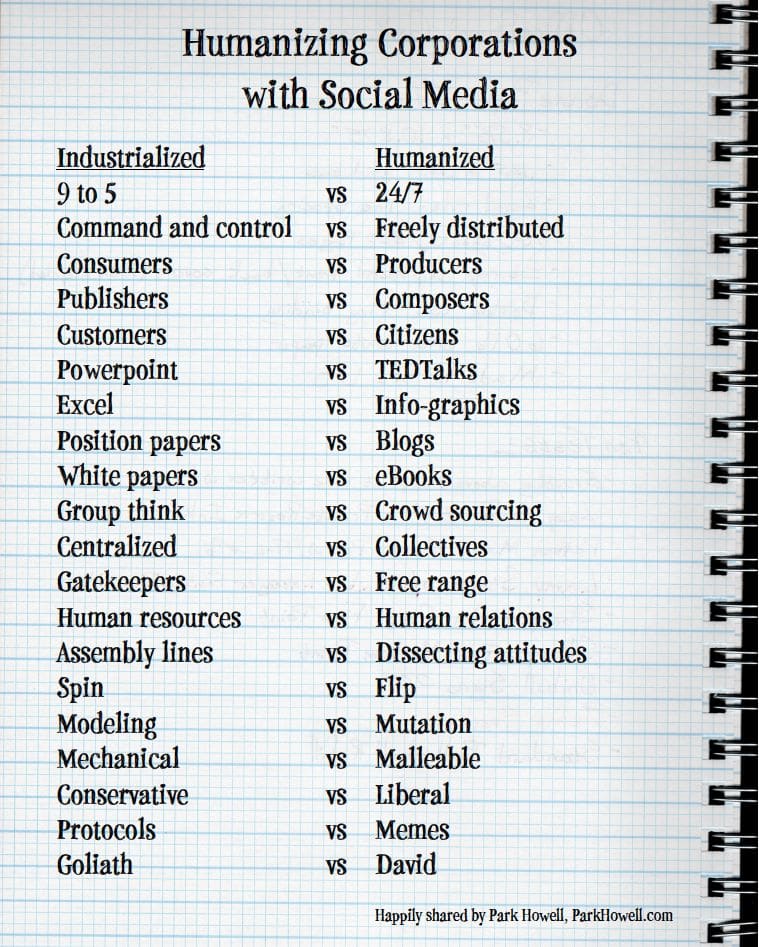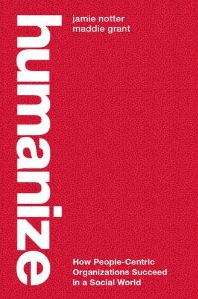Command and control. It is one of the lasting corporate legacies of the industrial age. But its grip is weakening. For 100 years, most American companies have approached corporate culture with a cold, mechanized hand. Just look at the Dilbert cartoons tacked to faceless cubicles, and you’ll see the Post-it cries for help from the people caught in this dystopian world.
However, like the famous quote from Jeff Goldblum’s character in Jurassic Park, “Life finds a way.”

Online social media has been released, and its organic growth is exponential. Why? Because employees want to be treated like people, not cogs. Customers are engaged citizens. Consumers have become producers. We’re growing wise to the in-your-face pitches that corporations have used to manipulate our so-called Freudian fears for the past 100 years, and we are responding to those that respect our Maslowian-aspirations for personal fulfillment. Social media has helped us take agency in our decisions and the brands we choose to associate with.
Control is swinging back to the people, and it rattles the very bedrock of institutions that are slow to move away from their industrial heritage, weakening their position and influence in society. The smart companies are embracing the new social world.

This concept of humanizing the corporation through social media was underscored to me in the book, Humanize: How People-Centric Organizations Succeed in a Social World, by Jamie Notter and Maddie Grant. I read Humanize yesterday while flying to Miami to prepare for my opening remarks on storytelling for the Goodwill International Summer Learning Event. I have the distinct pleasure of sharing the stage with Jamie. Although I am familiar with a number of the social media trends and concepts Humanize covers, his angle of replacing mechanized “best practices” when dealing with people with the more personal engagement that has sprung from the phenomenon of social media got me thinking.
So I started scribbling the above list of how humanity has creeped out of the confines of the cold corporate petri dish through online social media, and how its unstoppable growth (Like the the algae blooms in my swimming pool), is redefining the vary organizations whose DNA is programmed to control it.
Evolution is a funny thing, especially in the corporate setting. The web was conceived in a bureaucratic lab, and its potential for human expression and transcendency quickly took root growing faster than any tool for global socializing in history. The tendrils of its power and influence creep like a vine on a lattice, and gently consume the rigid structures and hierarchy that our Jurassic companies have used for a century to control livelihoods.
I don’t know about you, but I prefer the softer side of social media.
Adapt or die.












at 8:27 am
[…] on businessofstory.com Like this:LikeBe the first to like […]
at 7:36 am
[…] on businessofstory.com Share this:TwitterFacebookGostar disso:GosteiSeja o primeiro a gostar […]
at 5:25 pm
[…] to Park Howell’s blog entry “How social media is humanizing corporations,” social media has kickstarted an evolution in the corporate world. Howell learned all about this […]
at 3:00 am
[…] blooming like the algae in my swimming pool that no amount of chlorine can appear to quell. From my review of Humanize: “The tendrils of its power and influence creeps like a vine on a lattice, and it gently […]
at 5:06 am
[…] Then, someone conceived the Web to help people communicate, and the social evolutionary genie was let out of its bottle. Social media has taken on a life of its own, giving voice to and inspiring people around the world helping us all to transcend the command and control structures of corporations, bureaucracies, even entire countries (See Arab Spring). And it’s unstoppable, blooming like the algae in my swimming pool that no amount of chlorine can appear to quell. From my review of Humanize: […]
at 1:46 pm
[…] and not merely as ploys to make a sale. Try building brand awareness without being pushy. Customers want to be treated as people, not just numbers in your revenue […]